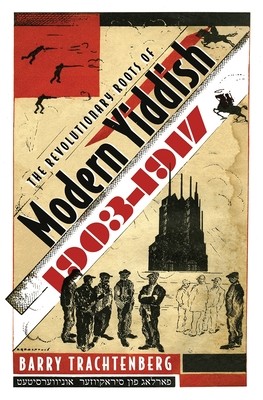
- We will send in 10–14 business days.
- Author: Barry Trachtenberg
- Publisher: Syracuse University Press
- ISBN-10: 0815631901
- ISBN-13: 9780815631903
- Format: 15.9 x 23.5 x 2.2 cm, hardcover
- Language: English
- SAVE -10% with code: EXTRA
The Revolutionary Roots of Modern Yiddish, 1903-1917 (e-book) (used book) | bookbook.eu
Reviews
Description
At the beginning of the twentieth century, Yiddish was widely viewed, even by many of its speakers, as a corrupt form of German that Jews had to abandon if they hoped to engage in serious intellectual, cultural, or political work. Yet, by 1917, it was the dominant language of the Russian Jewish press, a medium for modern literary criticism, a vehicle for science and learning, and the foundation of an ideology of Jewish liberation. Challenging many longstanding historical conceptions about the founding of modern Yiddish, The Revolutionary Roots of Yiddish Scholarship, 1903-1917 investigates the origins of contemporary Yiddish scholarship.
Trachtenberg reveals how, following the model set by other nationalist movements that were developing in the Russian empire, one-time revolutionaries such as the literary critic Shmuel Niger, the Marxist Zionist leader Ber Borochov, and the linguist Nokhem Shtif, dedicated themselves to the creation of a new branch of Jewish scholarship dedicated to their native language. The new Yiddish science was concerned with the tasks of standardizing Yiddish grammar, orthography, and word corpus, establishing a Yiddish literary tradition, exploring Jewish folk traditions, and creating an institutional structure to support their language's development. In doing so, the author argues, they hoped to reimagine Russian Jewry as a modern nation with a mature language and culture, and which deserved the same collective rights and autonomy that were being demanded by other nations in the empire.
EXTRA 10 % discount with code: EXTRA
The promotion ends in 16d.05:57:00
The discount code is valid when purchasing from 10 €. Discounts do not stack.
- Author: Barry Trachtenberg
- Publisher: Syracuse University Press
- ISBN-10: 0815631901
- ISBN-13: 9780815631903
- Format: 15.9 x 23.5 x 2.2 cm, hardcover
- Language: English English
At the beginning of the twentieth century, Yiddish was widely viewed, even by many of its speakers, as a corrupt form of German that Jews had to abandon if they hoped to engage in serious intellectual, cultural, or political work. Yet, by 1917, it was the dominant language of the Russian Jewish press, a medium for modern literary criticism, a vehicle for science and learning, and the foundation of an ideology of Jewish liberation. Challenging many longstanding historical conceptions about the founding of modern Yiddish, The Revolutionary Roots of Yiddish Scholarship, 1903-1917 investigates the origins of contemporary Yiddish scholarship.
Trachtenberg reveals how, following the model set by other nationalist movements that were developing in the Russian empire, one-time revolutionaries such as the literary critic Shmuel Niger, the Marxist Zionist leader Ber Borochov, and the linguist Nokhem Shtif, dedicated themselves to the creation of a new branch of Jewish scholarship dedicated to their native language. The new Yiddish science was concerned with the tasks of standardizing Yiddish grammar, orthography, and word corpus, establishing a Yiddish literary tradition, exploring Jewish folk traditions, and creating an institutional structure to support their language's development. In doing so, the author argues, they hoped to reimagine Russian Jewry as a modern nation with a mature language and culture, and which deserved the same collective rights and autonomy that were being demanded by other nations in the empire.


Reviews